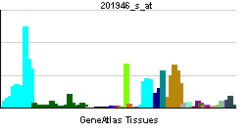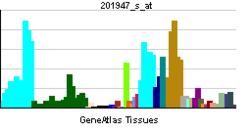CCT2 (gene)
| Chaperonin containing TCP1, subunit 2 (beta) | |||||||||||||
|---|---|---|---|---|---|---|---|---|---|---|---|---|---|
| Identifiers | |||||||||||||
| Symbols | CCT2 ; 99D8.1; CCT-beta; CCTB; HEL-S-100n; PRO1633; TCP-1-beta | ||||||||||||
| External IDs | OMIM: 605139 MGI: 107186 HomoloGene: 4696 GeneCards: CCT2 Gene | ||||||||||||
| |||||||||||||
| RNA expression pattern | |||||||||||||
 | |||||||||||||
 | |||||||||||||
| More reference expression data | |||||||||||||
| Orthologs | |||||||||||||
| Species | Human | Mouse | |||||||||||
| Entrez | 10576 | 12461 | |||||||||||
| Ensembl | ENSG00000166226 | ENSMUSG00000034024 | |||||||||||
| UniProt | P78371 | P80314 | |||||||||||
| RefSeq (mRNA) | NM_001198842 | NM_007636 | |||||||||||
| RefSeq (protein) | NP_001185771 | NP_031662 | |||||||||||
| Location (UCSC) | Chr 12: 69.98 – 70 Mb | Chr 10: 117.05 – 117.06 Mb | |||||||||||
| PubMed search | |||||||||||||
T-complex protein 1 subunit beta is a protein that in humans is encoded by the CCT2 gene.[1][2]
This gene encodes a molecular chaperone that is member of the chaperonin containing TCP1 complex (CCT), also known as the TCP1 ring complex (TRiC). This complex consists of two identical stacked rings, each containing eight different proteins. Unfolded polypeptides enter the central cavity of the complex and are folded in an ATP-dependent manner. The complex folds various proteins, including actin and tubulin. Alternate transcriptional splice variants of the gene described in this record have been observed but have not been thoroughly characterized.[2]
Interactions
CCT2 (gene) has been shown to interact with PPP4C.[3][4]
References
- ↑ Won KA, Schumacher RJ, Farr GW, Horwich AL, Reed SI (December 1998). "Maturation of Human Cyclin E Requires the Function of Eukaryotic Chaperonin CCT". Mol Cell Biol 18 (12): 7584–9. PMC 109339. PMID 9819444.
- ↑ 2.0 2.1 "Entrez Gene: CCT2 chaperonin containing TCP1, subunit 2 (beta)".
- ↑ Chen, Ginny I; Tisayakorn Sally, Jorgensen Claus, D'Ambrosio Lisa M, Goudreault Marilyn, Gingras Anne-Claude (October 2008). "PP4R4/KIAA1622 Forms a Novel Stable Cytosolic Complex with Phosphoprotein Phosphatase 4". J. Biol. Chem. (United States) 283 (43): 29273–84. doi:10.1074/jbc.M803443200. ISSN 0021-9258. PMC 2662017. PMID 18715871.
- ↑ Gingras, Anne-Claude; Caballero Michael; Zarske Marcel; Sanchez Amy; Hazbun Tony R; Fields Stanley; Sonenberg Nahum; Hafen Ernst; Raught Brian; Aebersold Ruedi (November 2005). "A novel, evolutionarily conserved protein phosphatase complex involved in cisplatin sensitivity". Mol. Cell Proteomics (United States) 4 (11): 1725–40. doi:10.1074/mcp.M500231-MCP200. ISSN 1535-9476. PMID 16085932.
Further reading
- Kubota H, Hynes G, Carne A et al. (1994). "Identification of six Tcp-1-related genes encoding divergent subunits of the TCP-1-containing chaperonin". Curr. Biol. 4 (2): 89–99. doi:10.1016/S0960-9822(94)00024-2. PMID 7953530.
- Llorca O, Smyth MG, Carrascosa JL et al. (1999). "3D reconstruction of the ATP-bound form of CCT reveals the asymmetric folding conformation of a type II chaperonin". Nat. Struct. Biol. 6 (7): 639–42. doi:10.1038/10689. PMID 10404219.
- Hynes GM, Willison KR (2000). "Individual subunits of the eukaryotic cytosolic chaperonin mediate interactions with binding sites located on subdomains of beta-actin". J. Biol. Chem. 275 (25): 18985–94. doi:10.1074/jbc.M910297199. PMID 10748209.
- Yokota S, Yanagi H, Yura T, Kubota H (2001). "Cytosolic chaperonin-containing t-complex polypeptide 1 changes the content of a particular subunit species concomitant with substrate binding and folding activities during the cell cycle". Eur. J. Biochem. 268 (17): 4664–73. doi:10.1046/j.1432-1327.2001.02393.x. PMID 11532003.
- McCormack EA, Llorca O, Carrascosa JL et al. (2002). "Point mutations in a hinge linking the small and large domains of beta-actin result in trapped folding intermediates bound to cytosolic chaperonin CCT". J. Struct. Biol. 135 (2): 198–204. doi:10.1006/jsbi.2001.4385. PMID 11580269.
- Strausberg RL, Feingold EA, Grouse LH et al. (2003). "Generation and initial analysis of more than 15,000 full-length human and mouse cDNA sequences". Proc. Natl. Acad. Sci. U.S.A. 99 (26): 16899–903. doi:10.1073/pnas.242603899. PMC 139241. PMID 12477932.
- Gevaert K, Goethals M, Martens L et al. (2004). "Exploring proteomes and analyzing protein processing by mass spectrometric identification of sorted N-terminal peptides". Nat. Biotechnol. 21 (5): 566–9. doi:10.1038/nbt810. PMID 12665801.
- Imai Y, Soda M, Murakami T et al. (2004). "A product of the human gene adjacent to parkin is a component of Lewy bodies and suppresses Pael receptor-induced cell death". J. Biol. Chem. 278 (51): 51901–10. doi:10.1074/jbc.M309655200. PMID 14532270.
- Jin J, Smith FD, Stark C et al. (2004). "Proteomic, functional, and domain-based analysis of in vivo 14-3-3 binding proteins involved in cytoskeletal regulation and cellular organization". Curr. Biol. 14 (16): 1436–50. doi:10.1016/j.cub.2004.07.051. PMID 15324660.
- Gerhard DS, Wagner L, Feingold EA et al. (2004). "The Status, Quality, and Expansion of the NIH Full-Length cDNA Project: The Mammalian Gene Collection (MGC)". Genome Res. 14 (10B): 2121–7. doi:10.1101/gr.2596504. PMC 528928. PMID 15489334.
- Andersen JS, Lam YW, Leung AK et al. (2005). "Nucleolar proteome dynamics". Nature 433 (7021): 77–83. doi:10.1038/nature03207. PMID 15635413.
- Guo D, Han J, Adam BL et al. (2005). "Proteomic analysis of SUMO4 substrates in HEK293 cells under serum starvation-induced stress". Biochem. Biophys. Res. Commun. 337 (4): 1308–18. doi:10.1016/j.bbrc.2005.09.191. PMID 16236267.